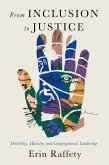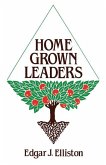American Christianity tends to view disabled persons as problems to be solved rather than people with experiences and gifts that enrich the church. Churches have generated policies, programs, and curricula geared toward "including" disabled people while still maintaining "able-bodied" theologies, ministries, care, and leadership. Ableism-not a lack of ramps, finances, or accessible worship-is the biggest obstacle for disabled ministry in America. In From Inclusion to Justice, Erin Raffety argues that what our churches need is not more programs for disabled people but rather the pastoral tools to repent of able-bodied theologies and practices, listen to people with disabilities, lament ableism and injustice, and be transformed by God's ministry through disabled leadership. Without a paradigm shift from ministries of inclusion to ministries of justice, our practical theology falls short.
Drawing on ethnographic research with congregations and families, pastoral experience with disabled people, teaching in theological education, and parenting a disabled child, Raffety, an able-bodied Christian writing to able-bodied churches, confesses her struggle to repent from ableism in hopes of convincing others to do the same. At the same time, Raffety draws on her interactions with disabled Christian leaders to testify to what God is still doing in the pews and the pulpit, uplifting and amplifying the ministry and leadership of people with disabilities as a vision toward justice in the kingdom of God.
Drawing on ethnographic research with congregations and families, pastoral experience with disabled people, teaching in theological education, and parenting a disabled child, Raffety, an able-bodied Christian writing to able-bodied churches, confesses her struggle to repent from ableism in hopes of convincing others to do the same. At the same time, Raffety draws on her interactions with disabled Christian leaders to testify to what God is still doing in the pews and the pulpit, uplifting and amplifying the ministry and leadership of people with disabilities as a vision toward justice in the kingdom of God.
Dieser Download kann aus rechtlichen Gründen nur mit Rechnungsadresse in A, D ausgeliefert werden.









